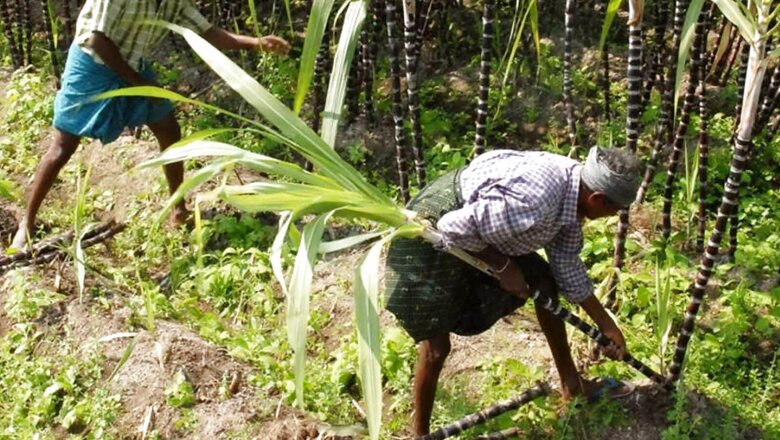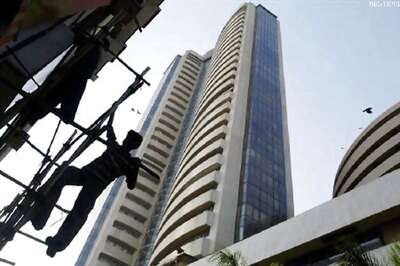
views
The agrarian idea of India’s economy needs revaluation as we have historically been an industrial nation that had the technology to build monuments, medical instruments. The iron used in Ashoka Stambh illustrates this fact. That was the time the balance between manufacturing, agriculture and trade was at its best. Each stakeholder in the society was happy and there was no need to impose a measure like MSP while the farmers actually fetched a much better deal. But ever since electoral interests contaminated every sphere of government, farming-related measures have done more harm than good, perhaps not only to the real farmers, but also the ordinary taxpayer who funds the government.
There has long been a conspicuous effort to romanticise farmers, mostly bolstered by the Left-leaning organisations to manifest Bharat as an agrarian economy, which is completely farcical at best and ludicrous at worst. This appears to be an attempt to create an identity crisis, since we are tired of being labelled as an agrarian and non-modern economy when we are neither. Rural India is no longer agrarian in terms of economics and jobs. Economist Ramesh Chand (currently a member of Niti Aayog) examined the rural economy’s transition in a study report for the Niti Aayog. Since 2004-05, he concluded, it has become a non-farm economy.
Farmers are abandoning agriculture in favour of non-agricultural occupations. It is purely a pragmatic decision because the latter earns them more money and there’s no emotional string attached to it. Following the economic reforms of 1991-92, this structural transformation happened between 1993-1994 and 2004-05, “growth in the agricultural sector decreased to 1.87 per cent, while growth in the non-farm economy soared to 7.93 per cent,” according to Chand’s research. Agriculture’s contribution to the rural economy fell sharply in 2004-05, from 57 per cent in 1993-94 to 39 per cent in 2004-05. “As a result, by 2004-05, the rural economy had shifted away from agriculture and toward non-agricultural activities.”
Minimum Support Price
The minimum support price (MSP) is a “minimum price” set by the government for any commodity it deems profitable for farmers. It is also the amount that government agencies pay for a specific crop when they buy it. It was first implemented in the mid-1960s, when India was experiencing a food deficit. “It’s just a government policy that influences administrative decisions. The government determines MSPs for crops, but there is no law requiring them to be implemented,” said Abhijit Sen, a former member of the Planning Commission and former chairman of Commission for Agricultural Costs and Prices (CACP). “If the government wants to, it can buy at MSPs. There is no legal requirement. It also can’t force others to pay (private merchants, organised retailers, processors, or exporters),” Sen added.
Based on the recommendations of the CACP, the Centre currently sets MSPs for 23 farm commodities: seven cereals (paddy, wheat, maize, bajra, jowar, ragi and barley), five pulses (chana, arhar/tur, urad, moong and masur), seven oilseeds (rapeseed, mustard, groundnut, soyabean, sunflower, sesamum, safflower) and four commercial crops (cotton, sugarcane, copra and raw jute). Wheat and paddy are purchased by the government at their MSPs. However, this is primarily due to political pressure and the necessity to meet the food grain requirements of the Public Distribution System (PDS), particularly following the passage of the National Food Security Act (NFSA). Sugarcane is the only crop with a legislative component to MSP payments, but that’s a topic for another day.
The so-called farmers are requesting the creation of a law that guarantees MSP; however, it is noteworthy that MSP has always been an administrative mechanism rather than a legislative one. The government has the freedom to increase the MSP as and when needed because it is an administrative instrument. Consider what would happen if it becomes legislation or is legally binding: not only would it kill the spirit of MSP, but it would also make practical implementation and revisions to MSP at regular intervals onerous. Farmers should only use private players for private transactions if they can get rates higher than MSP. Many farmers in water-stressed areas grow paddy and wheat solely to benefit from MSP, despite the fact that other crops would offer higher productivity and yield (per hectare). Paddy is a water-intensive crop, but even farmers in arid areas use it solely to gain from MSP. This is where Punjab and Haryana farmers get their hands on the steering wheel. It is safe to say that MSP has biased India’s agriculture industry toward a small number of crops.
Farmer leader Anil Ghanwat, a member of the panel set up by the Supreme Court to study the much contentious and now repealed farm laws, said the demand to extend minimum support price to 23 crops, if agreed to, will drive the country to bankruptcy. “Whoever pays for it (MSP), the Centre or the state, will go bankrupt soon. This is, in fact, a very precarious demand and is not sustainable. If agreed to, then within two years the country would go bankrupt. Right now, if the government agrees to the demand of 23 crops, then following the suit, other farmers would also come up with similar demands for their crops. There would be agitations every other day, in every other state asking for some crops not in MSP to be included in it,” he told the Economic Times.
Once you have given MSP to some, you have to give it to others too else a fresh set of agitations will set ablaze this country. The government also doesn’t have the infrastructure to procure the crops or sell them. “The country’s buffer stock limit is currently 41 lakh tonnes, but the government has had to procure 110 lakh tonnes of wheat and paddy. The government does not have the capacity to store this much grains, so these are kept out in the open, getting wet in the rain and getting rotten. Imagine if we add some more crops to the MSP list. How would the state procure it, where would it store?” he added.
One must admit that no country does this — governments provide subsidies, but not MSP, and certainly not for such a wide range of commodities. The so-called protesting farmers will not readily capitulate now because they believe that just because they were able to persuade the government to bend to their requests on the three farm bills, the government will cave in on the MSP as well. This is now the government’s responsibility; they brought it upon themselves. A better approach would be for the government to refrain from intervening and lowering agricultural food prices when they rise. When domestic prices rise, the government begins importing and imposes export restrictions. How will the farmer be able to make a living if the government continues to artificially lower prices? Traders, not the government, should be in charge of importing and exporting. Also, MSP turns into maximum price of the produce which could dent profitability for a whole lot of farmers who don’t intend to sell to the government. This fact has been pointed out by real farmers time and again but since they don’t boast of a propaganda machinery, they do not get their fair share of justice.
India’s MSP has become an economic disaster for every stakeholder, be it the farmers who actually need it or the government apparatus that is forced to buy farm produce that isn’t fit for consumption in a large number of cases and is only left to rot in the open. It instills an immense sense of compunction when the exchequer is used to subsidize everything right from fertilizers to the drip irrigation schemes and even diesel until recently while substandard produce is procured to fund the lives of VIP protestors and feudalist middlemen while the real beneficiaries continue to suffer alongside taxpayers.
Perhaps the right to buy a farm also flows from the bloodline as one cannot buy farmland if they’re not agriculturists. This means that a large section of taxpayers are forced by the government to handover their money to the agriculturists just because they’re entitled. On top of that, the income generated from agriculture is tax-free. Guaranteed MSP is, by all means, state-enabled loot and the government should be cautious because neither India is an agrarian economy nor the protestors pay a dime in taxes. We pay the taxes that fund everything, right from the fertilizers to irrigation projects, from building the roads that are choked by political vultures since last year to the repairs that will have to be made in the future. Taxpayers may not be a large chunk of the total votes but the government shouldn’t test our patience too much and shouldn’t make us pay beyond the taxes.
Yuvraj Pokharna is a Surat-based educator, columnist, and social activist. The views expressed in this article are those of the author and do not represent the stand of this publication.
Read all the Latest Opinions here


















Comments
0 comment